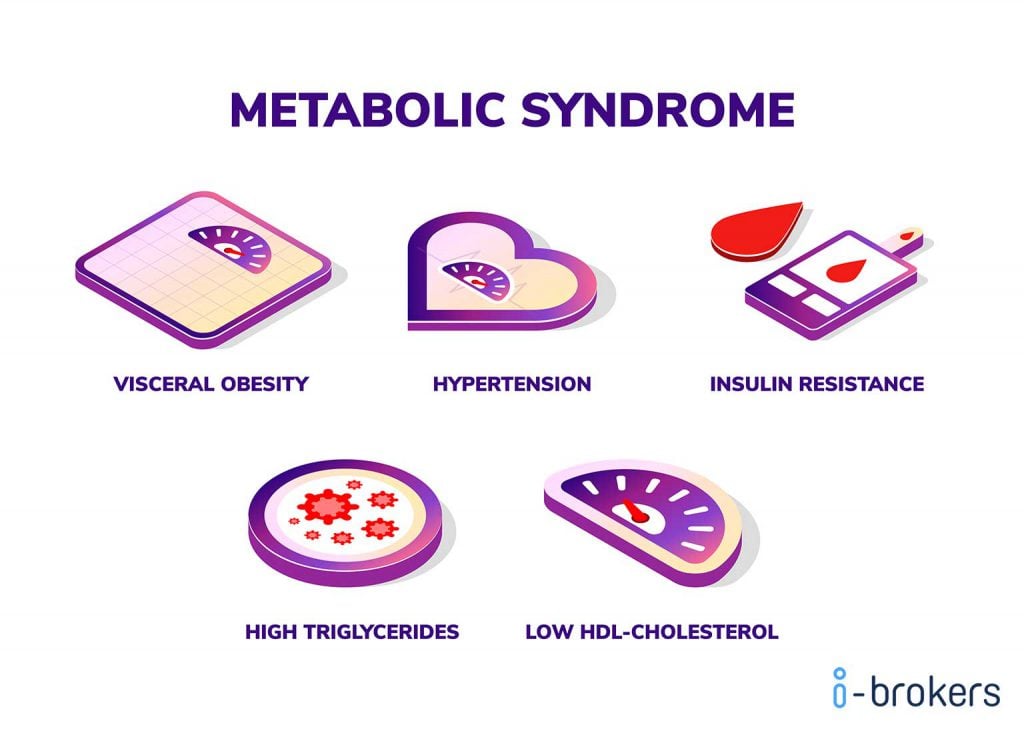Metabolic syndrome is a cluster of conditions that occur together, increasing your risk of heart disease, stroke and type 2 diabetes. These conditions include increased blood pressure, high blood sugar, excess body fat around the waist, and abnormal cholesterol or triglyceride levels.
Having just one of these conditions doesn’t mean you have metabolic syndrome. But it does mean you have a greater risk of serious disease. And if you develop more of these conditions, your risk of complications, such as type 2 diabetes and heart disease, rises even higher.
Therefore, in this blog post, we are going to share with you the symptoms, the causes, the risk factors, the complications and prevention tips for the metabolic syndrome.
Symptoms of Metabolic Syndrome
Most of the disorders associated with metabolic syndrome don’t have obvious signs or symptoms. One sign that is visible is a large waist circumference. And if your blood sugar is high, you might notice the signs and symptoms of diabetes — such as increased thirst and urination, fatigue, and blurred vision.
When to see a doctor
If you know you have at least one component of metabolic syndrome, ask your doctor whether you need testing for other components of the syndrome.
Causes
Metabolic syndrome is closely linked to overweight or obesity and inactivity.
It’s also linked to a condition called insulin resistance. Normally, your digestive system breaks down the foods you eat into sugar. Insulin is a hormone made by your pancreas that helps sugar enter your cells to be used as fuel.
In people with insulin resistance, cells don’t respond normally to insulin and glucose can’t enter the cells as easily. Consequently, your blood sugar levels increase even as your body churns out more and more insulin to try to reduce your blood sugar.

Risk Factors of Metabolic Syndrome
The following factors increase your chances of having metabolic syndrome:
Age
Your risk of metabolic syndrome increases with age.
Obesity
Carrying too much weight, especially in your abdomen, increases your risk of metabolic syndrome.
Diabetes
You’re more likely to have metabolic syndrome if you had diabetes during pregnancy (gestational diabetes) or if you have a family history of type 2 diabetes.
Other diseases
Your risk of metabolic syndrome is higher if you’ve ever had nonalcoholic fatty liver disease, polycystic ovary syndrome or sleep apnea.
Complications
Having metabolic syndrome can increase your risk of developing:
Heart and blood vessel disease
High cholesterol and high blood pressure can contribute to the buildup of plaques in your arteries. These plaques can narrow and harden your arteries, which can lead to a heart attack or stroke.
Type 2 diabetes
If you don’t make lifestyle changes to control your excess weight, you may develop insulin resistance, which can cause your blood sugar levels to rise. Eventually, insulin resistance can lead to type 2 diabetes.
How to prevent the conditions that cause metabolic syndrome
A lifelong commitment to a healthy lifestyle may prevent the conditions that cause metabolic syndrome. A healthy lifestyle includes:
• Eating plenty of vegetables, fruits, lean protein and whole grains
• Getting at least 30 minutes of physical activity most days
• Limiting saturated fat and salt in your diet
• Maintaining a healthy weight
• Not smoking
Takeaway
On the whole, preventing metabolic syndrome is certainly possible. Maintaining a healthy waist circumference and blood pressure and cholesterol levels reduce your risk for metabolic syndrome. Exercise and weight loss can aid in these efforts and decrease insulin resistance.
Specifically, eat a healthy diet that includes fruits, vegetables, and whole grains. Exercise is also important when it comes to preventing this condition. Regular physical activity will reduce your blood pressure, blood sugar, and cholesterol levels. The key is to try to maintain a healthy weight. Talk to your doctor before beginning an exercise program or radically changing your diet.
Prevention of metabolic syndrome will also require that you have regular physical exams. Your doctor can measure your blood pressure and complete blood work that may indicate the early development of metabolic syndrome. Early diagnosis of the condition and treatment will reduce health complications over the long term.


